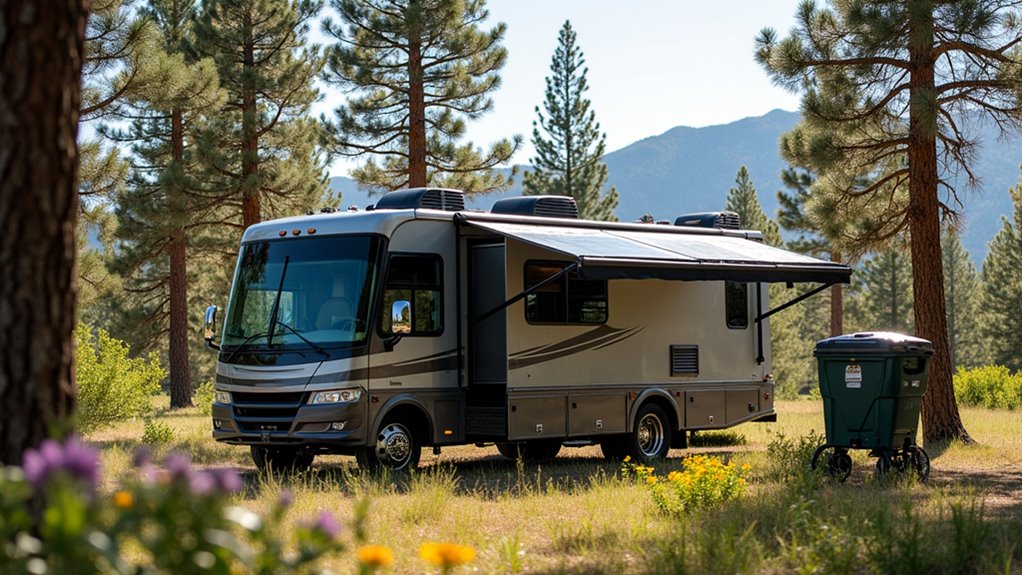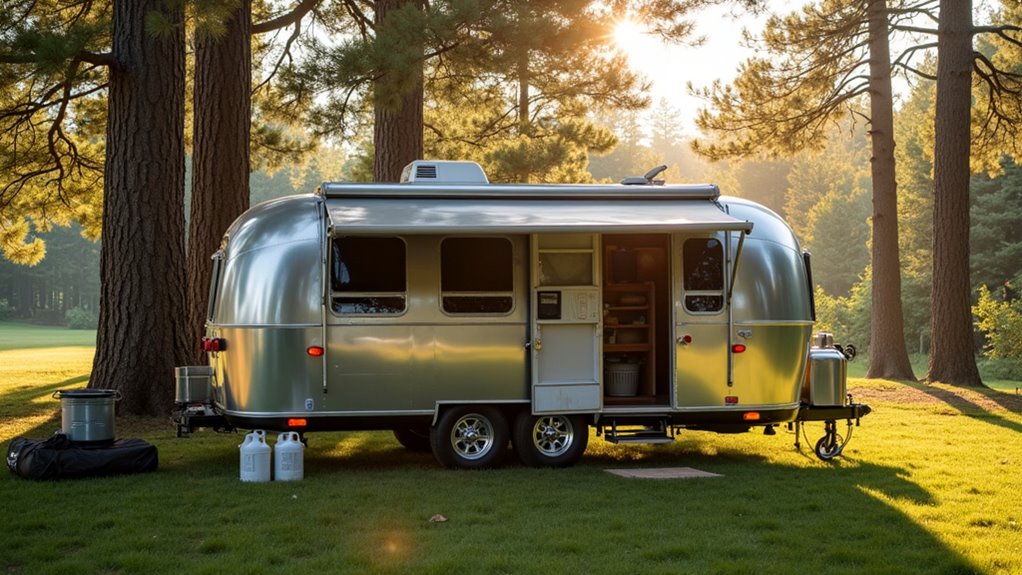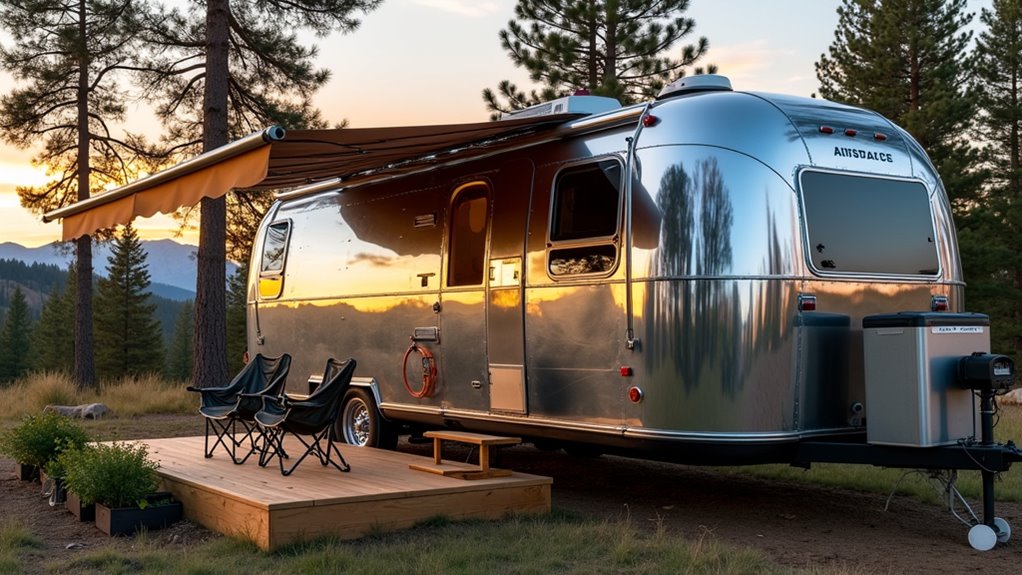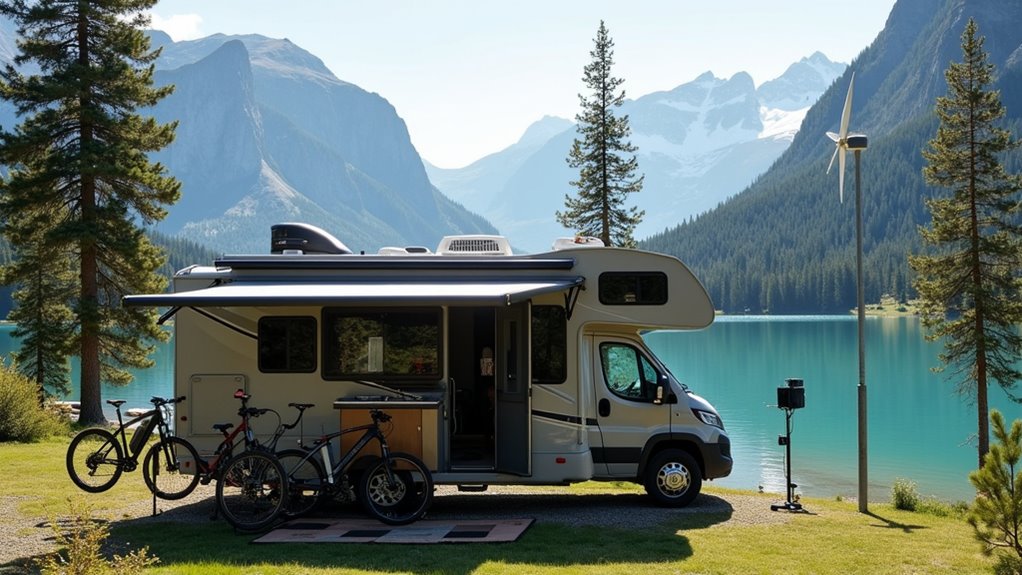Physical Address
304 North Cardinal St.
Dorchester Center, MA 02124
Physical Address
304 North Cardinal St.
Dorchester Center, MA 02124

Discover how eco-friendly RV living can revolutionize your road trips while protecting the wilderness you love to explore.
As Mother Nature faces increasing challenges, you’ve probably wondered how your wanderlust affects the environment. While RV living offers freedom and adventure, it doesn’t have to leave a hefty ecological footprint. You’ll find that modern sustainable practices can transform your home-on-wheels into an eco-conscious sanctuary. From solar innovations to water-saving techniques, there’s a world of green solutions waiting to enhance your journey—and you might be surprised by how simple and cost-effective these changes can be.

While RV living often appeals to those seeking a smaller environmental footprint, the reality involves complex trade-offs between mobility and sustainability.
You’ll typically generate fewer emissions than maintaining a traditional home if you limit your travels and embrace eco-conscious practices. However, your carbon impact can quickly escalate if you’re constantly on the move. An RV emits about 182 grams of CO2 per passenger mile, which adds up during frequent travel. According to real-world data, RV owners consume about twice as much gas compared to traditional homeowners. You’ll need to weigh this against the environmental cost of traditional living, including home energy consumption and daily commutes.
The good news? You can considerably reduce your impact through mindful choices. Essential eco-friendly camping gear can help minimize your environmental footprint while enjoying the freedom of RV life.
Making sustainable choices while RVing isn’t just possible – it’s essential for preserving the natural wonders we love to explore.
Using water-saving devices, properly managing waste, and choosing fuel-efficient models or alternative fuels will help minimize your environmental footprint while enjoying the freedom of RV life.
Ready to harness the sun’s power for your mobile lifestyle? You’ll need to start by strategically placing your panels where they’ll catch maximum sunlight, steering clear of shadows from AC units and other RV structures.
Whether you choose rigid panels with mounting brackets or flexible ones with adhesive, make sure you’re using stainless steel hardware to prevent vibration-related issues. Camping generators can provide additional power when solar isn’t enough.
Don’t overlook the importance of your charge controller and inverter setup – mount them in cool, ventilated spaces near your batteries for peak performance. A typical 100-Watt solar panel can generate approximately 350 Watt-hours of power daily to keep your system running efficiently.
You should use properly rated cables and include safety features like fuses and circuit breakers.
Consider installing a Bluetooth monitoring system to track your setup’s performance.
With careful planning and the right components, you’ll create an efficient, reliable solar system that’ll power your adventures while reducing your environmental footprint.

When it comes to sustainable RV living, smart water management stands at the forefront of eco-friendly practices.
You’ll find significant savings by upgrading to low-flow fixtures, which can cut your water usage by up to 50%. Installing aerated faucets and efficient toilets that use just 1-2 gallons per flush makes a remarkable difference. Regular leak detection checks will help identify and prevent costly water waste.
You can stretch your freshwater supply even further by adopting proven conservation habits. Track your tank levels closely, use designated containers for dishwashing, and consider a composting toilet system that eliminates water waste entirely. Staying hydrated while camping is also crucial to ensure your safety and well-being on the road.
Some RVers have achieved impressive results, managing two weeks on just 59 gallons of water.
For long-term solutions, look into rainwater harvesting systems and gray water recycling. These strategies not only reduce your environmental impact but also enhance your self-sufficiency on the road.
If you’re looking to minimize your environmental footprint while RVing, choosing eco-friendly materials and design features can make a substantial impact.
Start with sustainable insulation options like sheep’s wool or recycled denim, which provide excellent thermal protection while being environmentally responsible. The addition of biodegradable cleaning products helps maintain eco-friendly daily operations. Sustainable camping sleeping bags can also contribute to your RV’s eco-friendly comfort.
Opt for FSC-certified wood and reclaimed materials in your RV’s construction and interior design. You’ll find recycled glass countertops offer both durability and style, while GreenGuard-certified materials guarantee healthier indoor air quality.
Consider upgrading to energy-efficient appliances and LED lighting to reduce power consumption.
For infrastructure needs, recycled plastic and metal components offer long-lasting durability while supporting sustainable practices.
Don’t forget to incorporate smart home features for energy monitoring and renewable energy systems like solar panels to maximize your RV’s eco-friendly potential.

Taking meaningful steps to reduce your carbon footprint while RVing doesn’t have to be complicated. Start by optimizing your driving habits – maintain steady speeds, use cruise control on highways, and plan routes that avoid heavy traffic and steep inclines. You’ll save fuel and reduce emissions considerably.
Simple driving adjustments like steady speeds and smart route planning can significantly reduce your RV’s environmental impact while saving fuel.
Install solar panels and energy-efficient appliances to decrease your reliance on traditional power sources. Since the average US footprint is 16 tons annually, making these changes can significantly impact your environmental contribution. Embrace responsible camping for a greener experience.
Don’t forget about water conservation – low-flow fixtures and gray water systems can dramatically reduce your water usage. When you’re camping, choose sites that prioritize environmental initiatives and use eco-friendly cleaning products.
Support local businesses during your travels and engage with communities that share your environmental values.
Remember to pack reusable items and minimize waste by avoiding single-use products. Every small action contributes to a more sustainable RV lifestyle.
Modern power management systems have revolutionized sustainable RVing, offering unprecedented control over your energy consumption. Effective camping storage solutions can help you maximize efficiency and reduce waste.
You’ll maximize efficiency by upgrading to lithium batteries, which provide deeper discharge cycles and longer lifespans than traditional options. The advanced 48-volt electrical systems deliver enhanced power for running appliances like air conditioning more efficiently. Pair these with smart solar controllers to automatically optimize charging based on available sunlight.
Install a central energy monitoring system to track your power usage in real-time through wireless apps. You can identify energy-hungry appliances and set automated schedules to reduce waste.
For extended off-grid stays, hybrid systems let you seamlessly switch between solar, generator, and battery power. Priority settings guarantee critical devices stay powered during low-energy conditions, while automated load shedding disconnects non-essential equipment to preserve battery life.
These integrated solutions help you maintain comfort while minimizing your environmental impact.

As revolutionary green technologies transform the RV industry, you’ll find an exciting array of eco-friendly innovations reshaping how we travel and camp.
You’ll see hybrid Class A motorhomes offering impressive 500-mile ranges, while electric travel trailers like the Pebble Flow use regenerative braking to assist your tow vehicle. Modern RVs now feature Power Pro voice control for effortless operation of key systems.
Smart energy management systems now let you monitor power usage through apps, while high-capacity lithium batteries paired with efficient solar panels keep you comfortable off-grid.
Modern RVs harness smart power monitoring and solar-lithium systems to deliver reliable off-grid comfort and convenience.
You’ll appreciate the sustainable materials inside, from recycled upholstery to low-VOC finishes that improve air quality.
LED lighting and 12-volt appliances minimize power consumption, while advanced diagnostic tools help extend your RV’s lifespan.
These technologies aren’t just making RVing greener – they’re making it more convenient, comfortable, and capable than ever before.
While embracing a zero-waste lifestyle might seem challenging in an RV, you’ll find it’s surprisingly achievable with the right preparation and mindset.
Start by implementing these essential practices that’ll transform your RV adventures into eco-conscious journeys:
Thoughtful meal preparation beforehand helps eliminate unnecessary packaging and reduces food waste during your travels.
Rome wasn’t built in a day, and neither is sustainable RVing. You’re now equipped with the knowledge to make your home-on-wheels more eco-friendly while exploring the great outdoors. By embracing solar power, practicing water conservation, and choosing sustainable materials, you’ll reduce your environmental impact without sacrificing comfort. Remember, every small green choice you make contributes to preserving the natural wonders you’re out there to enjoy.